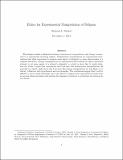Ethics for experimental manipulation of religion
Author(s)
Nielsen, Richard Alexander
Downloadeb89a2902f8ba8c71d6d559d167e32896df8.pdf (101.3Kb)
OPEN_ACCESS_POLICY
Open Access Policy
Creative Commons Attribution-Noncommercial-Share Alike
Terms of use
Metadata
Show full item recordAbstract
This chapter makes a distinction between measurement manipulations and change manipu- lations in experiments involving religion. Measurement manipulations are experimental inter- ventions that allow researchers to measure some aspect of religiosity or some characteristic of a religious individual. Change manipulations are experimental interventions in which researchers attempt to set some aspect of a subject's religiosity to a level or state that it would other- wise not attain. I argue that experiments that look more like measurement manipulations will generally be ethical, while those that look more like change manipulations are less likely to be ethical. I illustrate with hypothetical and real examples. The conclusions suggest that it will be difficult to learn causal knowledge about the effects of religion from experiments because there are serious ethical problems with setting the religiosity of subjects to levels that the subjects do not choose.
Date issued
2015-12Department
Massachusetts Institute of Technology. Department of Political ScienceJournal
Ethics and experiments
Publisher
Routledge
Citation
Nielson, Richard A. "Ethics for Experimental Manipulation of Religion." In Ethics and Experiments, Scott Desposato, Routledge, 2016.
Version: Original manuscript
ISBN
9781138909151